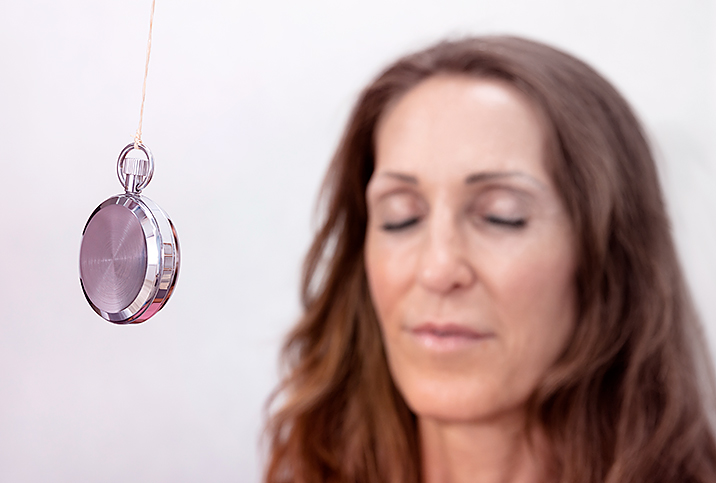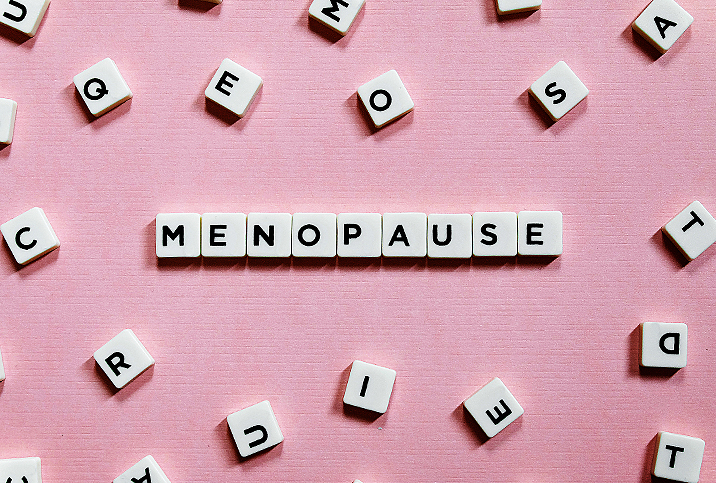Thinking Cool (Even When Your Body Isn't) May Help Ease Hot Flashes

Hot flashes and night sweats: Almost every woman going through perimenopause and menopause has experienced these vasomotor symptoms (VMS)—and how difficult it can be to find relief.
Some studies have suggested hypnotherapy can provide relief from this condition, which may be appealing to some women who cannot use menopausal hormone therapy and are looking for nonhormonal options. We talked to the experts to find out more about this unconventional treatment.
The science behind hot flashes
The exact cause of why women have these sudden body temperature spikes has not been discovered. But doctors and researchers do know that hot flashes and night sweats (which are the same condition) correlate with the loss of sexual hormone production during the menopausal stages.
The vasomotor center is located in the lower regions of our brain in the medulla oblongata and is part of the regulation system for controlling our core body temperature. Researchers have linked menopausal hot flashes to three possibilities:
- The narrowing of a woman's temperature threshold, which defines her core body temperature.
- A disruption to the circulation of the skin's blood flow.
- The brain is learning to "reset" to the new neurochemical levels due to the loss of hormone production.
The need for nonhormonal treatment options
Gary Elkins, Ph.D., a professor of psychology and neuroscience and director of the Mind-Body Medicine Research Lab at Baylor University, is one of the lead clinicians and researchers on the topic. He has conducted and contributed to many studies regarding the use of hypnosis to reduce hot flashes.
He said he first became interested in developing a hypnosis intervention because of the Women's Health Initiative hormone therapy trials, which found the use of hormone replacement therapy (HRT) was linked to a slightly increased risk of developing breast cancer and cardiovascular disease for some women.
Though more recent research suggests the benefits of HRT (now called menopausal hormone therapy, or MHT) outweigh the risks for most women, this treatment option is not right for everyone.
Hypnosis intervention can reduce hot flashes by 70 to 80 percent with daily self-practice.
"Breast cancer patients generally are advised against [the] use of estrogen therapies for hot flashes," Elkins explained. "This led to the need for a safe and effective alternative that would give more women a choice of therapies to manage menopausal symptoms, such as hot flashes and sleep disturbances."
Elkins said his initial studies on the subject, published in the journal Menopause in 2013, "found that a hypnosis intervention could reduce hot flashes by 70 to 80 percent with daily practice of self-hypnosis."
"Hypnosis has consistent evidence for [a] clinically significant reduction of hot flashes," concluded a 2019 article in the Journal of Evidence-Based Integrative Medicine, which Elkins was an author on. "However, trained practitioners are not widely available, thus limiting its use."
How does hypnotherapy help?
Elkins outlined how hypnosis works for some women with menopausal vasomotor symptoms.
"Hypnosis has some similarity to other mind-body interventions, such as mindfulness and meditation, that also involve a focus of attention," Elkins explained. "Many people experience this hypnotic state as pleasant and relaxing. Hypnotherapy involves deepening [focused attention] and [giving] therapeutic suggestions toward improvement [of] symptoms and well-being."
A few of the suggested images Elkins uses "often include mental imagery for coolness, such as a cool mountain breeze, a snowy day or standing under a cool waterfall," he said. "Many women preferred mental imagery…that involved cool water."
His protocol for the reduction of hot flashes and night sweats is "daily hypnosis practice sessions" lasting six to seven weeks. This option may seem too time-consuming for most women—there are also online and mobile applications "to help women self-manage hot flashes." Elkins suggests using the app from Mindset Health, but there are several menopause apps available.
Guidance from gynecologists
Suzanne Hall, M.D., a gynecologist and obstetrician practicing in Michigan, spoke of the decline in hormone therapy for menopausal symptoms and said it was due to women's concern about MHT, as well as a growing interest in "nonhormonal options for treatment, such as Swedish pollen flower" and "lifestyle and/or mind-body connection therapies to remedy their symptoms."
"An estimated 50 to 75 percent of menopausal women use complementary or alternative therapies in the management of their symptoms," she added.
Although Hall hasn't referred any of her patients to hypnotherapy for VMS since it "has not been 'proven' as a recommended treatment strategy," she is a "proponent of mind-body-based therapies for stress reduction."
"I believe that learning your triggers for hot flashes (e.g., spicy foods, alcohol, emotional tension) helps to prepare for or prevent some symptoms," she explained. "Learning relaxation techniques in lowering stress and learning to control our emotional response to stressors may not only help in managing the hot flashes but in managing life's stressors in general."
Taraneh Shirazian, M.D., a gynecologic surgeon in New York and consultant for Bonafide, said she doesn't view hypnotherapy as a common way to decrease the frequency and intensity of hot flashes. However, she agreed with Hall that "a combination of approaches can help most women."
"For example," Shirazian said, "many women tell me that exercise and a low-sugar diet helps with hot flashes. Also, supplements [have] helped many women decrease the intensity and frequency of symptoms.
"The best approach," Shirazian continued, "is one that incorporates multiple aspects of care, including minimizing stress and focusing on self-care."
Shirazian advises menopausal women start with lifestyle changes, such as "sleep, change in diet, exercise and meditation…optimizing their daily health, including their mental health. Then, I would add supplements, such as primrose oil and Swedish pollen flower. Lastly, I would look at prescription medication when all the lifestyle changes and supplements, with efficacy data, have been exhausted."
Deciding on what's best for you
How women decide to treat their hot flashes and night sweats during the menopausal transition is a personal decision. All three health experts I interviewed agreed that mind-body approaches do help women manage stress and strengthen mindful practices. Hypnosis, by definition of its practice and as Elkins outlined in his treatment strategy, focuses on relaxation techniques and stress management.
Hall qualified her hesitation of hypnosis by stating that though "some studies have shown benefits [of] hypnosis for the treatment of hot flashes…the data is limited." And, she added, "though self-referral for hypnosis is certainly reasonable, further studies of its efficacy are needed before it can be 'recommended' as a proven treatment strategy."
The best decisions about women's healthcare choices are informed decisions. You can find out more about hot flashes and night sweats from The North American Menopause Society and the International Menopause Society—both have online resources for education and research.
And, if you're interested in trying nonhormonal treatment options for hot flashes and night sweats, be sure to discuss this with your gynecologist, as they can best advise you on the various options.




















